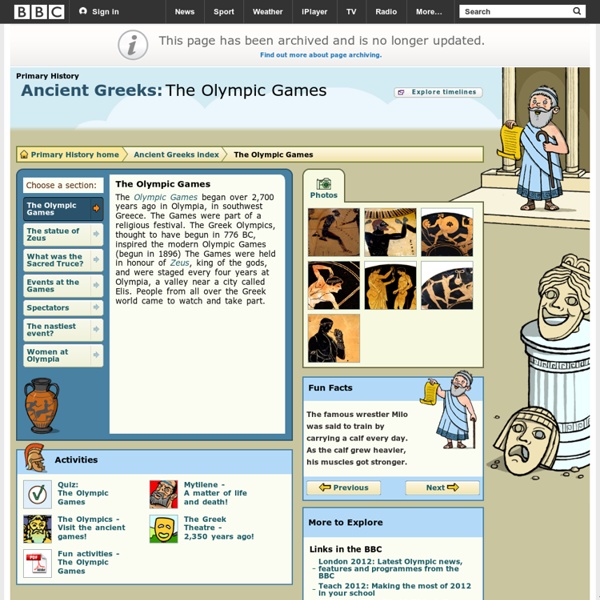



Ancient Olympic Games During the celebration of the games, an Olympic Truce was enacted so that athletes could travel from their countries to the games in safety. The prizes for the victors were olive leaf wreaths or crowns. The games became a political tool used by city-states to assert dominance over their rivals. Politicians would announce political alliances at the games, and in times of war, priests would offer sacrifices to the gods for victory. The games were also used to help spread Hellenistic culture throughout the Mediterranean. The Olympics also featured religious celebrations and artistic competitions. Origins An artist's impression of ancient Olympia Another myth, this one occurring after the aforementioned myth, is attributed to Pindar. History The games were held to be one of the two central rituals in Ancient Greece, the other being the much older religious festival, the Eleusinian Mysteries.[16] The "Exedra" reserved for the judges at Olympia on the north embankment of the stadium Culture Events
The Ancient Olympics Ancient and Modern Olympic SportsA Tour of Ancient OlympiaThe Context of the Games and the Olympic SpiritAthletes' Stories Frequently Asked Questions About the Ancient Olympics Offical website of the Olympic Movement Further Reading This exhibit is a subset of materials from the Perseus database and is copyrighted. Homepage - London 2012 The London 2012 Games were centred around the Olympic Park in east London, which is the site of a number of new sports venues. Up to 180,000 spectators a day entered the Park to enjoy the Games, making it the principal focus of Olympic activity. The main venues – the Olympic Stadium, Aquatics Centre, Velodrome and BMX Circuit, as well as the hockey, handball and basketball arenas – were easily accessible through a network of footbridges and walkways within the Park. The Olympic Village was within walking distance of all the venues in the Park, enhancing the experience for athletes and officials. The London 2012 Games included a four-year Cultural Olympiad.
Olympic Games The modern Olympic Games (French: Jeux olympiques[1]) are the leading international sporting event featuring summer and winter sports competitions wherein thousands of athletes variously compete. The Olympic Games are considered the world's foremost sports competition with more than 200 nations participating.[2] The Olympic Games are held every four years, with the Summer and Winter Games alternating by occurring every four years but two years apart. Their creation was inspired by the ancient Olympic Games, which were held in Olympia, Greece, from the 8th century BC to the 4th century AD. Baron Pierre de Coubertin founded the International Olympic Committee (IOC) in 1894. The evolution of the Olympic Movement during the 20th and 21st centuries has caused several changes to the Olympic Games. The Olympic Movement comprises international sports federations (IFs), National Olympic Committees (NOCs), and organizing committees for each specific Olympic Games. Ancient Olympics Modern Games
GCSE PE We have FREE GCSE PE revision lessons for PE students and Free resources for PE Teachers and Coaches to download and use in your own lessons including lesson ideas and worksheets. PE GCSE Revision Lessons Work through our GCSE Physical Education bite sized online revision lessons. We have split GCSE PE into The Human Body, Health and Fitness, Training and Sports Skills and Sport in Society. The Human Body Bones, Joints, Muscles, The Respiratory System, The Circulatory System Health and Fitness Health and Fitness, Exercise, The effects of exercise, Diet and nutrition, Energy, Endurance, Strength, speed and power, Flexibility, Age and gender, Somatotype, Sport and personality, Hygiene, Drugs, Other factors affecting performance Training and Sporting Skills Training sessions, Training methods, Fitness testing, Sports injuries, Injury treatments, Skills, Motivation and arousal Sport in Society Free PE Teaching Worksheets and Lesson Ideas Test Yourself Fun And Games! Who wants to be a millionaire?